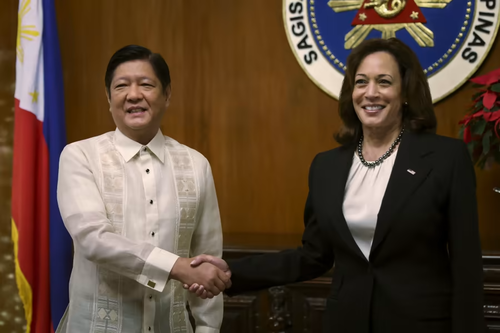
Authored by Dave DeCamp via AntiWar.com,
Vice President Kamala Harris on Monday reaffirmed that an attack on Philippine vessels in the South China Sea would trigger a US response under the 1951 Mutual Defense Treaty between the US and the Philippines. The warning to Beijing came as she was visiting Manila.
"An armed attack on the Philippines Armed Forces, public vessels, or aircraft in the South China Sea would invoke US mutual defense commitments. And that is an unwavering commitment that we have to the Philippines," Harris said while meeting with Philippine President Ferdinand Marcos Jr.

Harris’ warning came amid reports of a tense encounter between Chinese and Philippine vessels in the South China Sea. The Philippine Navy said a Chinese vessel blocked a Philippine naval boat on Sunday and forcibly seized what appeared to be Chinese rocket debris that the Philippine boat was towing.
For their part, China denied it was a forcible seizure and said its vessel took the debris after having a "friendly negotiation at the scene." The incident happened near Thitu Island, a feature of a disputed archipelago in the South China Sea known as the Spratly Islands.
China, the Philippines, and several other Southeast Asian nations all have overlapping claims to the South China Sea. The US has inserted itself into the dispute by sailing warships near Chinese-controlled islands to challenge Beijing’s claims. The US has also formally rejected most of China’s claims to the waters while not picking a side between other claimants.
On Tuesday, Harris visited the Philippine province of Palawan, an island province on the South China Sea just outside of waters claimed by Beijing. There, she delivered a speech aboard a Philippine Coast Guard vessel. The visit is unusual and is clearly meant as a message to Beijing as Harris will be the highest-level US official to ever visit Palawan.
After her speech in the Philippines, Kamala Harris has to be reminded to greet the U.S. servicemen and women standing right behind her. pic.twitter.com/2nR0E2z4D8
— RNC Research (@RNCResearch) November 22, 2022
One purpose of Harris’ visit is to work to expand the US military presence in the Philippines under the 2014 Enhanced Defense Cooperation Agreement (EDCA). The agreement allows the US to build military facilities for US and Philippine forces, and Washington is looking to expand construction.
The work to strengthen the US-Philippine military alliance is part of the US effort to expand its presence in the region to counter China, as outlined by the Biden administration’s Indo-Pacific Strategy. Over in Indonesia, Secretary of Defense Lloyd Austin met with his counterpart to push for stronger military ties.
US @VP Harris now aboard @coastguardph's BRP Teresa Magbanua here in Palawan. She's currently touring and being briefed by Filipino officials. She's also set to deliver a speech here extolling the role of PCG & reiterating US support to PH | @davidyusantos pic.twitter.com/LN0q6QCWpz
— CNN Philippines (@cnnphilippines) November 22, 2022
The Pentagon said that Austin and his Indonesian counterparts agreed "to expand bilateral military training and education, including through hosting new language training courses, expanding cooperation for emerging defense leaders, and enhancing combined exercises."
Authored by Dave DeCamp via AntiWar.com,
Vice President Kamala Harris on Monday reaffirmed that an attack on Philippine vessels in the South China Sea would trigger a US response under the 1951 Mutual Defense Treaty between the US and the Philippines. The warning to Beijing came as she was visiting Manila.
“An armed attack on the Philippines Armed Forces, public vessels, or aircraft in the South China Sea would invoke US mutual defense commitments. And that is an unwavering commitment that we have to the Philippines,” Harris said while meeting with Philippine President Ferdinand Marcos Jr.

Harris’ warning came amid reports of a tense encounter between Chinese and Philippine vessels in the South China Sea. The Philippine Navy said a Chinese vessel blocked a Philippine naval boat on Sunday and forcibly seized what appeared to be Chinese rocket debris that the Philippine boat was towing.
For their part, China denied it was a forcible seizure and said its vessel took the debris after having a “friendly negotiation at the scene.” The incident happened near Thitu Island, a feature of a disputed archipelago in the South China Sea known as the Spratly Islands.
China, the Philippines, and several other Southeast Asian nations all have overlapping claims to the South China Sea. The US has inserted itself into the dispute by sailing warships near Chinese-controlled islands to challenge Beijing’s claims. The US has also formally rejected most of China’s claims to the waters while not picking a side between other claimants.
On Tuesday, Harris visited the Philippine province of Palawan, an island province on the South China Sea just outside of waters claimed by Beijing. There, she delivered a speech aboard a Philippine Coast Guard vessel. The visit is unusual and is clearly meant as a message to Beijing as Harris will be the highest-level US official to ever visit Palawan.
After her speech in the Philippines, Kamala Harris has to be reminded to greet the U.S. servicemen and women standing right behind her. pic.twitter.com/2nR0E2z4D8
— RNC Research (@RNCResearch) November 22, 2022
One purpose of Harris’ visit is to work to expand the US military presence in the Philippines under the 2014 Enhanced Defense Cooperation Agreement (EDCA). The agreement allows the US to build military facilities for US and Philippine forces, and Washington is looking to expand construction.
The work to strengthen the US-Philippine military alliance is part of the US effort to expand its presence in the region to counter China, as outlined by the Biden administration’s Indo-Pacific Strategy. Over in Indonesia, Secretary of Defense Lloyd Austin met with his counterpart to push for stronger military ties.
US @VP Harris now aboard @coastguardph‘s BRP Teresa Magbanua here in Palawan. She’s currently touring and being briefed by Filipino officials. She’s also set to deliver a speech here extolling the role of PCG & reiterating US support to PH | @davidyusantos pic.twitter.com/LN0q6QCWpz
— CNN Philippines (@cnnphilippines) November 22, 2022
The Pentagon said that Austin and his Indonesian counterparts agreed “to expand bilateral military training and education, including through hosting new language training courses, expanding cooperation for emerging defense leaders, and enhancing combined exercises.”







